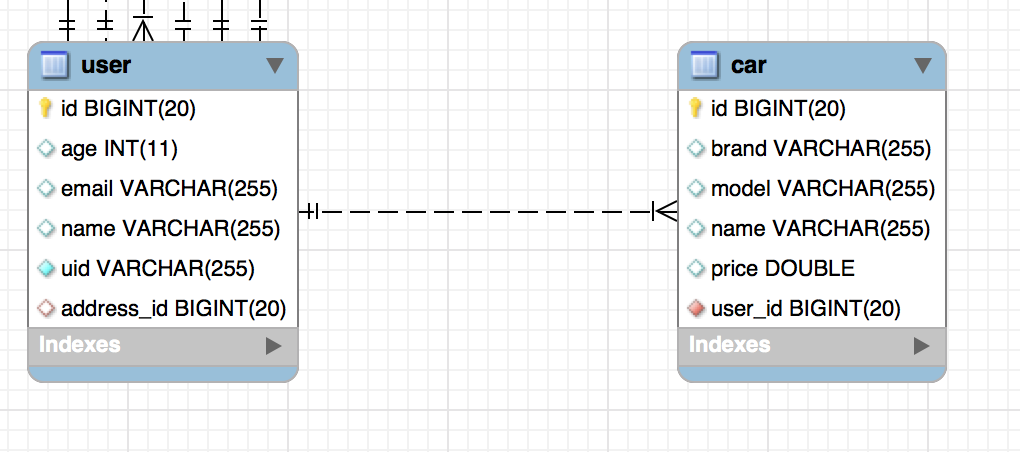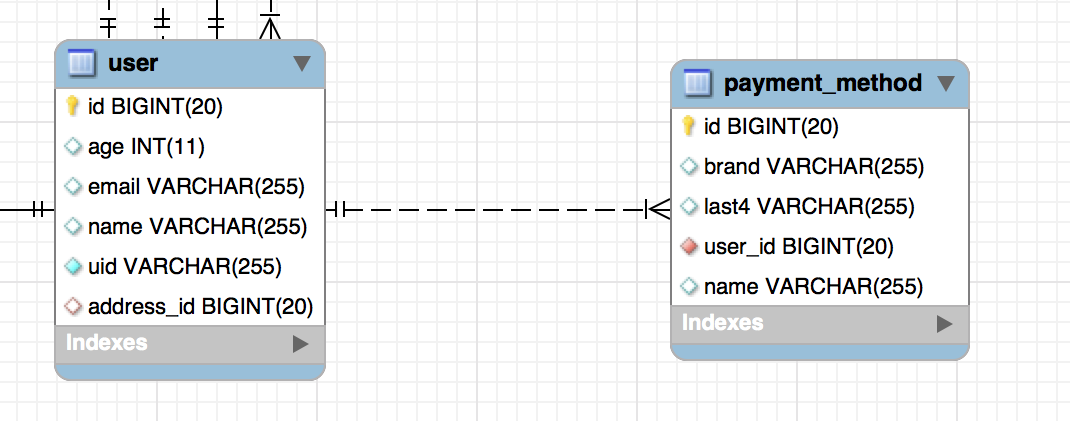Spring Data Many To One Mapping
The many to one mapping is from the one-to-many relationship. It is from the child side of the one-to-many relationship. Check out the one to many relationship here.
Many to one relationship mean that many instances of some entity can have a relationship with only one instance of another entity. For example, many cars can belong to only one person or user.
Many to One Bidirectional

package com.lovemesomecoding.car;
import java.io.Serializable;
import javax.persistence.Column;
import javax.persistence.Entity;
import javax.persistence.FetchType;
import javax.persistence.GeneratedValue;
import javax.persistence.GenerationType;
import javax.persistence.Id;
import javax.persistence.JoinColumn;
import javax.persistence.ManyToOne;
import javax.persistence.Table;
import com.fasterxml.jackson.annotation.JsonIgnoreProperties;
import com.fasterxml.jackson.annotation.JsonInclude;
import com.fasterxml.jackson.annotation.JsonInclude.Include;
import com.lovemesomecoding.user.User;
@JsonInclude(value = Include.NON_NULL)
@Entity
@Table(name = "car")
public class Car implements Serializable {
private static final long serialVersionUID = 1L;
@Id
@GeneratedValue(strategy = GenerationType.IDENTITY)
@Column(name = "id", nullable = false, updatable = false, unique = true)
private Long id;
@Column(name = "name")
private String name;
@Column(name = "brand")
private String brand;
@Column(name = "model")
private String model;
@Column(name = "price")
private Double price;
@JsonIgnoreProperties(value= {"cars"})
@ManyToOne(fetch = FetchType.EAGER)
@JoinColumn(name = "user_id", nullable=false)
private User user;
public Car() {
super();
// TODO Auto-generated constructor stub
}
// setters and getters
package com.lovemesomecoding.user;
import java.io.Serializable;
import java.util.HashSet;
import java.util.Set;
import javax.persistence.CascadeType;
import javax.persistence.Column;
import javax.persistence.Entity;
import javax.persistence.FetchType;
import javax.persistence.GeneratedValue;
import javax.persistence.GenerationType;
import javax.persistence.Id;
import javax.persistence.JoinColumn;
import javax.persistence.JoinTable;
import javax.persistence.ManyToMany;
import javax.persistence.OneToMany;
import javax.persistence.OneToOne;
import javax.persistence.Table;
import org.apache.commons.lang3.builder.EqualsBuilder;
import org.apache.commons.lang3.builder.HashCodeBuilder;
import org.apache.commons.lang3.builder.ToStringBuilder;
import com.fasterxml.jackson.annotation.JsonIgnoreProperties;
import com.fasterxml.jackson.annotation.JsonInclude;
import com.fasterxml.jackson.annotation.JsonInclude.Include;
import com.lovemesomecoding.car.Car;
@JsonInclude(value = Include.NON_NULL)
@Entity
@Table(name = "user")
public class User implements Serializable {
private static final long serialVersionUID = 1L;
@Id
@GeneratedValue(strategy = GenerationType.IDENTITY)
@Column(name = "id", nullable = false, updatable = false, unique = true)
private Long id;
@Column(name = "uid", unique = true, nullable=false, updatable=false)
private String uid;
@Column(name = "name")
private String name;
@Column(name = "email")
private String email;
@Column(name = "age")
private int age;
@JsonIgnoreProperties(value= {"user"})
@OneToMany(mappedBy = "user", cascade=CascadeType.ALL, fetch=FetchType.EAGER)
private Set<Car> cars;
public User() {
super();
// TODO Auto-generated constructor stub
}
// getters and setters
Many to One Unidirectional
It’s very useful to map an entity to another entity which does not map back. This is a perfect solution in a situation where you are not using the child class very often. For example, you have a

package com.lovemesomecoding.paymentmethod;
import java.io.Serializable;
import javax.persistence.Column;
import javax.persistence.Entity;
import javax.persistence.FetchType;
import javax.persistence.GeneratedValue;
import javax.persistence.GenerationType;
import javax.persistence.Id;
import javax.persistence.JoinColumn;
import javax.persistence.ManyToOne;
import javax.persistence.Table;
import com.fasterxml.jackson.annotation.JsonIgnoreProperties;
import com.fasterxml.jackson.annotation.JsonInclude;
import com.fasterxml.jackson.annotation.JsonInclude.Include;
import com.lovemesomecoding.user.User;
@JsonInclude(value = Include.NON_NULL)
@Entity
@Table(name = "payment_method")
public class PaymentMethod implements Serializable {
private static final long serialVersionUID = 1L;
@Id
@GeneratedValue(strategy = GenerationType.IDENTITY)
@Column(name = "id", nullable = false, updatable = false, unique = true)
private Long id;
@Column(name = "name")
private String name;
@Column(name = "brand")
private String brand;
@Column(name = "last4")
private String last4;
@ManyToOne(fetch = FetchType.EAGER)
@JoinColumn(name = "user_id", nullable=false)
private User user;
public PaymentMethod() {
super();
// TODO Auto-generated constructor stub
}
// getters and setters